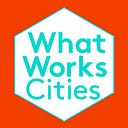Welcoming Five New Cities
Celebrating 90 Cities
Today, we welcomed five new cities to our community: Baton Rouge, LA; Cary, NC; Fayetteville, NC; Hayward, CA; and Winston-Salem, NC. We’re now working with 90 cities across the country that are home to more than 28 million people in 37 states and have annual budgets exceeding $96 billion.
Cities are teaming up with our partners to build the skills that will allow them to maximize the use of their data to make more informed decisions, develop stronger programs and services, and better serve their communities.
Our new cities are excited to get to work. Meet them and learn more about their plans below.
Baton Rouge, Louisiana
Baton Rouge will develop a data-driven framework to track progress in housing recovery efforts related to the August 2016 flooding in the state. The City will also engage community stakeholders while developing an open data policy and exploring opportunities for residents to use municipal data.
In the City’s words:
In Baton Rouge, we have seen firsthand the power of data and how it can be used to enhance government operations, improve resident engagement, increase transparency, and spur innovation in our community. We are excited to take the next step in our efforts to establish a data-driven, performance-based culture in local government, and we look forward to how our partnership with Bloomberg Philanthropies and What Works Cities will continue to build on this work in making Baton Rouge an even greater place to live, work, play, and call home.
Cary, North Carolina
Cary will support the research and development of a citizen contact center by strengthening the collection and analysis of call data, and will also develop an open data policy.
In the City’s words:
Every day in the Town of Cary, we are dedicated to creating a better place for our residents and for those who visit, work, and play here. We’re also focused on using data to make better decisions, not only for today but also to guide Cary into the future. We look forward to partnering with What Works Cities’ partners the Center for Government Excellence at Johns Hopkins University and the Sunlight Foundation on this journey of resident empowerment and strategic data management.
Fayetteville, North Carolina
Fayetteville will use performance analytics to improve stormwater management efforts, a priority for the City since the impact of Hurricane Matthew in 2016.
In the City’s words:
We’re working to refine our performance management program, TRACStat, which enables us to be an engaged leader in the community for innovation, effective change management, and continuous improvement strategies through evidence-based decisions, accountability, and transparency. Our What Works Cities project will help us define a comprehensive set of performance measures for stormwater projects and operations that will assist us in making evidence-based policy decisions and will allow us to better communicate the efficiency and effectiveness of our stormwater program to residents.
Hayward, California
Hayward will upgrade its ability to manage and open data, with a focus on improving safety and quality of life by curbing illegal dumping.
In the City’s words:
We’re excited to join What Works Cities and its partner the Center for Government Excellence at Johns Hopkins University as we tackle the issue of illegal dumping in our community. This partnership will improve our ability to treat data as a strategic asset, leverage that data more effectively for reliable insights and more efficient service provisions, and build the foundation for advanced data practices.
Winston-Salem, North Carolina
Winston-Salem will apply data-driven tools to its six strategic focus areas, starting with making neighborhoods more livable. The City will also create an open data policy, and develop a performance management framework that empowers staff to make more data-informed decisions in all areas of city government.
In the City’s words:
We plan to apply what we learn through our partnership with What Works Cities to all aspects of city government in general and, in particular, to the six focus areas of the strategic plan our City Council adopted in May. We’ll begin by targeting the focus area of fostering livable neighborhoods. For example, stronger use of data can drive us closer toward that goal by helping us better direct resources to address blight, improve code enforcement, and allocate recreation resources.
To learn more about the accomplishments of participating cities, check out our recent report, “What Works Cities: How Local Governments Are Changing Lives.” View a full list of participating cities here.
